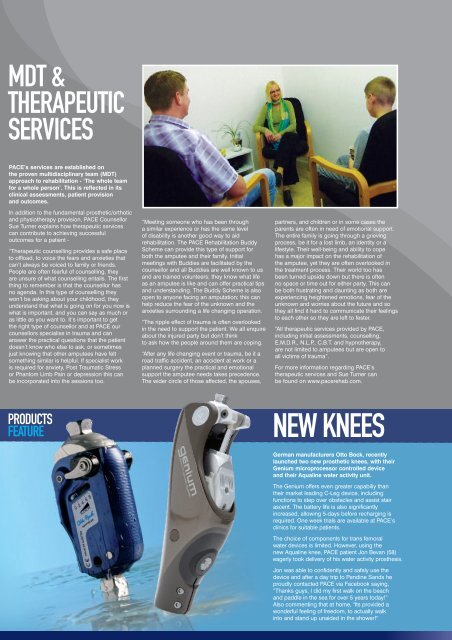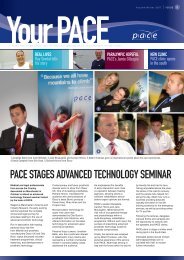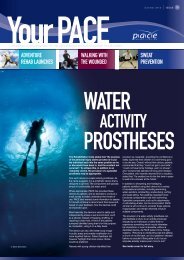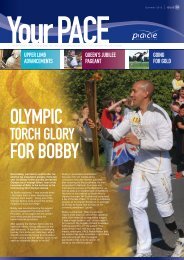Issue 13 - Winter 2011/12 - PACE Rehabilitation
Issue 13 - Winter 2011/12 - PACE Rehabilitation
Issue 13 - Winter 2011/12 - PACE Rehabilitation
You also want an ePaper? Increase the reach of your titles
YUMPU automatically turns print PDFs into web optimized ePapers that Google loves.
MDT &<br />
THERAPEUTIC<br />
SERVICES<br />
<strong>PACE</strong>’s services are established on<br />
the proven multidisciplinary team (MDT)<br />
approach to rehabilitation - ‘The whole team<br />
for a whole person’. This is reflected in its<br />
clinical assessments, patient provision<br />
and outcomes.<br />
In addition to the fundamental prosthetic/orthotic<br />
and physiotherapy provision, <strong>PACE</strong> Counsellor<br />
Sue Turner explains how therapeutic services<br />
can contribute to achieving successful<br />
outcomes for a patient -<br />
“Therapeutic counselling provides a safe place<br />
to offload, to voice the fears and anxieties that<br />
can’t always be voiced to family or friends.<br />
People are often fearful of counselling, they<br />
are unsure of what counselling entails. The first<br />
thing to remember is that the counsellor has<br />
no agenda. In this type of counselling they<br />
won’t be asking about your childhood, they<br />
understand that what is going on for you now is<br />
what is important, and you can say as much or<br />
as little as you want to. It’s important to get<br />
the right type of counsellor and at <strong>PACE</strong> our<br />
counsellors specialise in trauma and can<br />
answer the practical questions that the patient<br />
doesn’t know who else to ask, or sometimes<br />
just knowing that other amputees have felt<br />
something similar is helpful. If specialist work<br />
is required for anxiety, Post Traumatic Stress<br />
or Phantom Limb Pain or depression this can<br />
be incorporated into the sessions too.<br />
“Meeting someone who has been through<br />
a similar experience or has the same level<br />
of disability is another good way to aid<br />
rehabilitation. The <strong>PACE</strong> <strong>Rehabilitation</strong> Buddy<br />
Scheme can provide this type of support for<br />
both the amputee and their family. Initial<br />
meetings with Buddies are facilitated by the<br />
counsellor and all Buddies are well known to us<br />
and are trained volunteers; they know what life<br />
as an amputee is like and can offer practical tips<br />
and understanding. The Buddy Scheme is also<br />
open to anyone facing an amputation; this can<br />
help reduce the fear of the unknown and the<br />
anxieties surrounding a life changing operation.<br />
“The ripple effect of trauma is often overlooked<br />
in the need to support the patient. We all enquire<br />
about the injured party but don’t think<br />
to ask how the people around them are coping.<br />
“After any life changing event or trauma, be it a<br />
road traffic accident, an accident at work or a<br />
planned surgery the practical and emotional<br />
support the amputee needs takes precedence.<br />
The wider circle of those affected, the spouses,<br />
partners, and children or in some cases the<br />
parents are often in need of emotional support.<br />
The entire family is going through a grieving<br />
process, be it for a lost limb, an identity or a<br />
lifestyle. Their well-being and ability to cope<br />
has a major impact on the rehabilitation of<br />
the amputee, yet they are often overlooked in<br />
the treatment process. Their world too has<br />
been turned upside down but there is often<br />
no space or time out for either party. This can<br />
be both frustrating and daunting as both are<br />
experiencing heightened emotions, fear of the<br />
unknown and worries about the future and so<br />
they all find it hard to communicate their feelings<br />
to each other so they are left to fester.<br />
“All therapeutic services provided by <strong>PACE</strong>,<br />
including initial assessments, counselling,<br />
E.M.D.R., N.L.P., C.B.T. and hypnotherapy,<br />
are not limited to amputees but are open to<br />
all victims of trauma”.<br />
For more information regarding <strong>PACE</strong>’s<br />
therapeutic services and Sue Turner can<br />
be found on www.pacerehab.com.<br />
PRODUCTS<br />
FEATURE<br />
NEW KNEES<br />
German manufacturers Otto Bock, recently<br />
launched two new prosthetic knees, with their<br />
Genium microprocessor controlled device<br />
and their Aqualine water activity unit.<br />
The Genium offers even greater capabiliy than<br />
their market leading C-Leg device, including<br />
functions to step over obstacles and assist stair<br />
ascent. The battery life is also significantly<br />
increased, allowing 5-days before recharging is<br />
required. One week trials are available at <strong>PACE</strong>’s<br />
clinics for suitable patients.<br />
The choice of components for trans femoral<br />
water devices is limited. However, using the<br />
new Aqualine knee, <strong>PACE</strong> patient Jon Bevan (58)<br />
eagerly took delivery of his water activity prosthesis.<br />
Jon was able to confidently and safely use the<br />
device and after a day trip to Pendine Sands he<br />
proudly contacted <strong>PACE</strong> via Facebook saying,<br />
“Thanks guys, I did my first walk on the beach<br />
and paddle in the sea for over 5 years today!”<br />
Also commenting that at home, "Its provided a<br />
wonderful feeling of freedom, to actually walk<br />
into and stand up unaided in the shower!"





